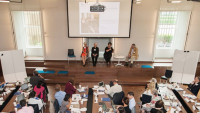Robert N. Butler Columbia Aging Center
The Center’s mission is to conduct interdisciplinary research and provide education to advance the goals of increasing health span for all in our world of longer lives, building the knowledge as to how to create wellbeing in our new second half of life, and making longevity an asset so that people of all ages may better thrive in our world’s aging societies.
News
- August 23, 2023
Thirty percent of pre-retirees will face worse expected health and economic status
Topic
Aging and Healthy Longevity - September 6, 2023
The Robert N. Butler-Jack Rosenthal Age Boom Academy inspires New York Times editorial coverage of our readiness for an Aging America.
Topic
Aging and Healthy Longevity - October 9, 2023
The National Academy of Medicine honored Dean Fried with its prestigious David Rall Medal.
Topic
Aging and Healthy Longevity
Events
- Thursday, April 25, 202412:00 PM to 1:00 PM
Venue
Hybrid Event - Thursday, May 2, 202412:00 PM to 1:00 PM
Venue
Hybrid Event Hess Commons - Thursday, May 16, 202411:30 AM to 12:30 PM
Venue
Hybrid Event









